“Please,” begged Deanna, “you don’t understand . . .”
“Now just wait a second,” he said, with a calm and soothing voice. “I’ll be right back.” He reached into the back of his pickup and grabbed something, then turned back toward her, revealing what he held. It was a piece of a white picket fence, broken so that the white wood came to a sharp point.
And then Deanna noticed the man’s eyes. One pupil was closed down completely, the other wide and wild. This man had already been to the fair.
“We’ll take care of you,” said the man. “Fix you up real good.”
Deanna could now see that the tip of the picket was already covered with blood.
In the pickup, the boy mindlessly sang a single line from a nursery rhyme over and over like a broken record, lazily rolling his head from side to side, as he watched his father throw Deanna to the ground.
“This won’t hurt but a bit,” the madman said as he raised the picket above his head and pointed it at Deanna’s heart.
Deanna would have screamed if she still had a voice.
Tufts of white speckled a rich blue sky on the Idaho—Oregon border. It was a weak legion of clouds that could not even block out the sun.
Michael could not remember blue sky; there were always clouds and storms tormenting the heavens, and when the storms slept, there was always a numbing fog keeping the sky an everlasting gray.
But not today.
Michael lay on a brushy hillside staring up at the glorious sky. Beneath them lay Huntington, Oregon. They were barely a hundred miles out of Boise, but to Michael, what they left behind in Boise was a million miles away.
“What do they look like?”
Michael turned to see Tory come up beside him.
“That’s what you’re doing, isn’t it? Looking for shapes in the clouds?”
“I was just looking.” Michael sat up and glanced down the hill where the town spread out before them. Changing leaves glimmered in afternoon sunlight turning the town to gold. The air was neither hot nor cold, but temperate. Nice. Normal.
They had spent an entire day and night in and around Boise, spiraling outward from the epicenter of Chaos, searching for The Others, or, more specifically, the redheaded boy who was at the core of the nightmare. But they had also wasted time as they reveled in this new feeling of freedom now that the beasts were gone. It had taken until the next morning for them to feel the slightest pull northwest, and they realized he had left town long ago.
Now they had driven into Oregon and, somewhere in the town below, a tireless Winston was searching for signs of ruin, but he was the only one. Here on the hill, Lourdes lay on her back, asleep, with every exhalation breathing out another ounce of fat, and he and Tory just looked at the clouds.
Michael glanced at Tory and smiled.
“What is it?” she asked.
“Your eyelashes,” said Michael. “The way you were before, I could never see them.” What he didn’t tell her was that he never really looked at her face before. It had been so hideous. He could not bear the sight. But now the sores had closed, and bit by bit the swelling was going down.
Tory gingerly touched her face. “There’ll be scars. There are always scars from bad skin conditions, you know?”
“Maybe not,” offered Michael, wondering about the scars his own condition might leave behind.
Michael lay back down and turned his eyes to the clouds again, his mind finding their shapes. An angel. A unicorn. A tall sailing ship. He had always played this game as a child. He was very good at it.
“Can I tell you something, Tory?”
“Shoot.”
“I don’t think I’m as brave as the rest of you.”
“How do you figure?”
Michael kept his eyes on the drifting clouds. A wind seemed to fill the sail of the tall ship. “Well, take Winston, for example; he feels this in his gut. He knows he has to go out there and take care of this bad kid. And you—you were the strong one, who pulled the rest of us all this way . . . and if it weren’t for Lourdes, I would have given up a long time ago. . . .”
“I was ready to call it quits lots of times,” said Tory.
“How about now?” He turned to Tory, but Tory didn’t answer. “I saw that horror in Boise,” said Michael. “I know what that other kid is capable of . . . I know what I was capable of too . . . but now I’ve come out of the nightmare, Tory. Maybe there’s some blood-sucking Hell-thing driving him to do what he does—but the one that was inside of me is gone! The problem is, it was living in me for so long, I can’t remember being any other way. I don’t know how to feel about anyone or anything, you know?”
Michael looked away. “Tory . . . I don’t even know if I like girls.”
“You mean ...”
“I mean I don’t know what I mean. I don’t know anything.” Michael took a deep breath. “It’s like everything inside me has been locked in a vault since I was eleven, and now that same eleven-year-old kid is coming back out. I’ve got to learn how to feel all over again, because right now I don’t feel anything either way, if you know what I mean.”
“Well, I don’t think it’s something you can figure out in one day. If we make it through this we’ll have our whole lives to deal with the regular stuff, but right now we’ve got other things to think about,” reminded Tory. “Our friendly neighborhood Hell-pets are still out there—they can still come back ...”
“If they’re not back already, then maybe they’ve found a better place to be,” said Michael. “Anyway, I don’t want to go looking for them under stones. I just want to go home, figure out who I am, and how I’m supposed to feel . . . and then be normal. I don’t even care what shade of normal it happens to be. Any kind of normal would suit me just fine.”
Michael turned to see Tory dab a tear from her face.
“I don’t think we get to be normal,” she said. “We’re Scorpion Shards, remember?” Then she took his hand, “Come here, I want to show you something. It’s sort of a . . . magic trick.”
She led him over the hill to a burned-out campsite—a place with torn mattresses and soggy cardboard. It reeked of urine and rot, and it reminded Michael of the type of world they had traveled through to get this far—to get into the light of this pleasant day.
“Find me something disgusting,” said Tory. “The most disgusting thing you can find.”
There were plenty of disgusting things around to chose from. Michael settled for a sopping rag, so rank it had turned black. It smelled like death on a bad day. He picked it up with his fingernails—just touching the thing made his body shiver in disgust.
“Now give it to me,” requested Tory.
Michael held it in her direction. “What are you going to do?”
“You’ll see.”
She took the disgusting rag and, to Michael’s horror, used it to wipe her hands, then, as if that wasn’t bad enough, she brought it to her face and wiped her face with it. Michael had to look away. Finally, when she was done she held the rag back up to Michael.
“Take it,” she said.
Michael reluctandy held out his fingertips and grabbed the corner of the rag. The rag was still wet, but that’s all it was. A damp rag, perfectly clean, as if it had just been taken out of the washer. Even the smell was gone.
“Kills germs on contact,” said Tory. “I’m better than Listerine.”
Michael smelled the rag again, amazed. He wiped his own face with it and felt its cool sterile dampness on his face.
“Everyone’s got a hidden talent,” said Tory. “I suppose ours are a bit more interesting than most. Our talents are less . . . normal.”
Читать дальше
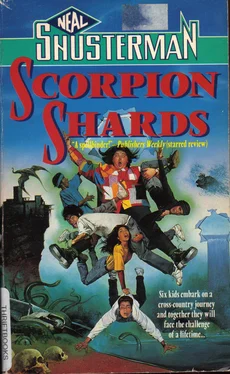
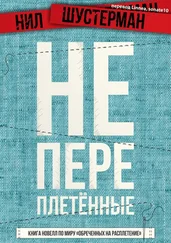
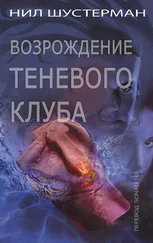
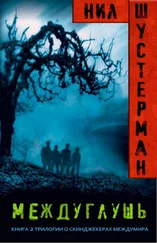
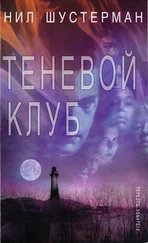
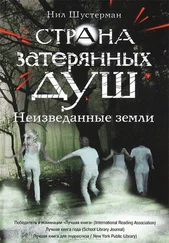
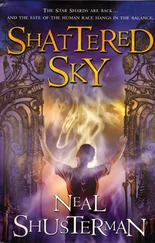
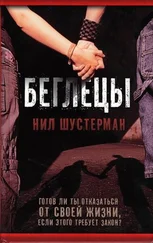
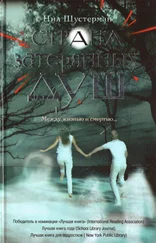


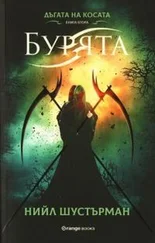
![Нил Шустерман - Жнец [litres]](/books/418707/nil-shusterman-zhnec-litres-thumb.webp)